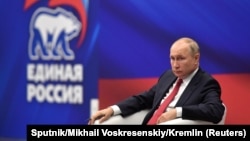Authorities in Russia arrested a mathematician on terrorism charges Monday after he had just completed a prison sentence for hooliganism, the latest step in a yearslong Kremlin crackdown on political opponents.
Azat Miftakhov, 30, was detained minutes after his release from a penal colony over 900 kilometers east of Moscow, according to Russian media reports. His lawyer, Svetlana Sidorkina, told Russian state news agency Tass that Miftakhov was charged with justifying terrorism and refused to plead guilty.
Miftakhov was arrested in 2019 and accused of attacking a Moscow office of the Kremlin's ruling United Russia Party, allegations he rejected. At the time, he was a postgraduate student pursuing an advanced degree in math and professed anarchist views. He accused authorities of torturing him in detention.
A Moscow court convicted him of hooliganism in 2021 and sentenced him to six years in prison. Human Rights Watch called his conviction "clearly unjust and unfair." Memorial, Russia's oldest human rights group and a co-winner of the 2022 Nobel Peace Prize, declared Miftakhov a political prisoner.
With the time he spent in pretrial detention taken into account, Miftakhov was released Monday from IK-17, a penal colony in the Kirov region northeast of Moscow.
Miftakhov's supporters told Russian media that he was taken back into custody minutes after he came out of the facility and barely had time to speak to his relatives waiting outside.
Tass reported Monday that the new charges center around conversations with other inmates during which Miftakhov allegedly expressed support for a 2018 attack on a regional office of Russia's Federal Security Service that killed three officers of the agency, known by the Russian acronym FSB.
Authorities deemed the attack an act of terrorism.
Kremlin critics and political opponents of Russian President Vladimir Putin have come under increased pressure from the government in recent years. Many were arrested and sentenced to lengthy prison terms. Others have left the country to avoid being prosecuted.
The number of arrests and raids targeting opposition activists increased exponentially after Russia sent troops into Ukraine on February 24, 2022.

















